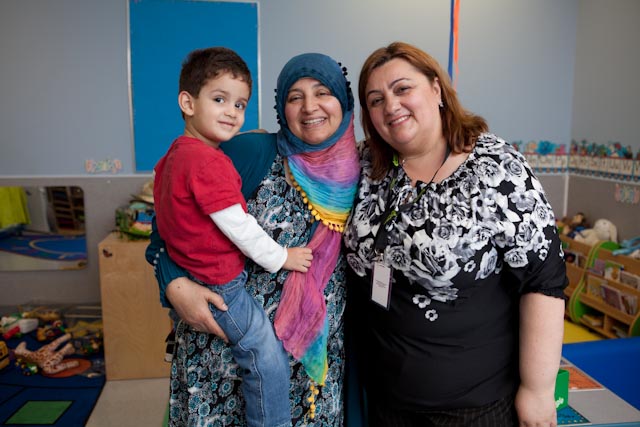
Quality care for the children of newcomer families has been available and regulated for many years through National LINC Childminding and Occasional Child Care. These programs were designed to create safe, stimulating environments for children, giving parents the freedom they needed to focus on their own educational and s
ettlement needs.
More recently, Care for Newcomer Children (CNC) was launched and is now in its second year of operation.
Ultimately, the CNC program aims to assist newcomer parents and their children by providing child care supports so they can successfully settle in Canada. Programs for newcomer parents and standards for care help to ensure parents have easy access to the services they need close to home. English classes and settlement programs can provide them with the necessary knowledge and skills to communicate with doctors, teachers, neighbours, and potential employers.
But do parents see the care their children receive as valuable? Does it make a difference in their lives?
To better understand how the parents feel about the care their children receive, CMAS designed and conducted an evaluation.
Focus groups were conducted with newcomer parents in Hamilton, Mississauga, Halifax and Toronto, individual interviews were held with both parents and staff, and an online survey was conducted with staff across Canada.
Participants included CNC administrators, staff with designated responsibility, CNC caregivers, and newcomer parents who were currently using the CNC program (both short term and long term care).
Results
Overall the CNC program was rated well by both newcomer parents and CNC staff.
From the newcomer parents’ perspectives, it was encouraging to hear that CNC programs are successfully assisting them with parenting and their children with learning.
Participants shared a variety of positive outcomes for both their children and themselves:
- Children learn educational skills and topics.
“It’s an incredible program. My son is improving a lot in English. He now knows the life cycle of butterflies. He really learns something here.”
“My child is learning how to write and she is only three years old.”
“It is not only play but education.”
- Children learn life skills, such as: eating alone and at the table, sharing, and to be polite.
“They teach [children] how to tie shoes and how to share.”
- Children learn behaviour and to follow the rules. Parents learn how to parent for behaviour.
“My children’s behaviour is better after coming here.”
“Listen to daycare teacher and now she listens to me.”
“Give advice about our child.”
“Told me what to do to help with my son’s behaviour; teach me and help me.”
- Children are social with other children while learning to be independent, simultaneously.
“[The children] have a social life.”
“Learn faster with other kids than staying home alone.”
“They learn to be independent.”
“Easy to leave child with a babysitter now.”
“He can sit alone without me all the time.”
- The program is very successful in supporting parents to access the settlement services they need to become engaged in Canadian Society.
“We have time to go to an [settlement] appointment.”
“Without daycare we can’t study English.”
“[Without daycare] we have to stay home.”
“Before, I had to bring my daughter to the counselor office and give her toys and watch her. This disturbs me; we are talking private but my daughter is listening.”
- And finally, parents can socialize with and learn from other parents, helping to alleviate their loneliness and isolation.
“Social environment; feels like a family with parents and teachers.”
“We socialize here.”
“We now have lots of friends.”
“After school we stay at home; here I have a social life; I stayed one year at home.”
This may surprise some CNC Staff!
Sometimes, CNC staff felt there was a lack of respect for the work they do. They felt that parents saw them as ‘babysitters’ rather than respected professionals.
But nothing could be further from the truth.
The newcomer parents who participated in the focus groups and interviews were very positive.
“They take children as individual that needs different services and support.”
“We know the kids are safe.”
“I really appreciate what they are doing for our children.”
“They notice everything.”
“The teacher’s qualifications are very good; they have experience with different children.”
And most notable, parents recognize that it is the “teachers” – the CNC staff – that taught their children certain skills and behaviours.
“When I used to fasten the seatbelt my daughter refused but the teacher supported me and now she does the seatbelt herself; they teach our children these habits.”
“My son learns; at first he didn’t understand anything, now he reads the alphabet; I feel happy about it.”
“[Staff] told me what to do to help with my son’s behaviour; teach me and help me.”
“They teach [children] how to tie shoes and how to share.”
CNC staff are valued and respected
CNC staff can be proud of the work they do! They not only have a positive impact on the newcomer children in their care, but on the lives of their parents as well.
Susan Hoo, Manager for CMAS sums up the results:
“CNC was created to help newcomer families in their transition to Canada. It provides a great place for children to grow and learn, and offers a warm welcome for parents. Our programs make a big difference in their lives. CNC teams across the country should feel very proud, not only because what they do for the children is valuable but also because the parents respect and appreciate the staffs’ hard work.”






